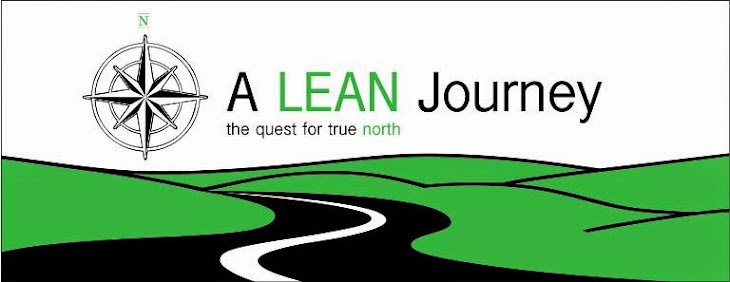On Fridays I will post a Lean related Quote. Throughout our lifetimes many people touch our lives and leave us with words of wisdom. These can both be a source of new learning and also a point to pause and reflect upon lessons we have learned. Within Lean active learning is an important aspect on this journey because without learning we can not improve.
“Waste is a tax on the whole people.” — Albert W. Atwood
A simple, profound statement that reminds me of our shared social responsibility.
In recent years many companies have established a fundamental goal to minimize the environmental impact while maintaining high quality and service for all business processes and products. This is commonly referred to as sustainability or green manufacturing. According to the Department of Commerce, “Sustainable manufacturing is the creation of manufactured products that use processes that minimize negative environmental impacts, conserve energy and natural resources, are safe for employees, communities, and consumers and are economically sound.”
When implementing lean within our organizations, equipment reliability is a predominant foundational element that enables lean operational performance. Embracing green manufacturing requires giving more focus to environmental and energy concerns during the implementation of reliability improvement projects. Improvements geared toward improving equipment reliability have distinct linkages to environmental performance.
As most manufacturers are starting to realize, the quest to become green takes them right back to Lean. Applying ‘Lean Principles’ – a systematic approach to identifying and eliminating waste through continuous improvement – is one of the key ways to enhance environmental performance. By applying the tools, systems thinking, and lessons learned from the process improvement methodology they can effectively operationalize sustainability.
Lean and sustainability are conceptually similar. Both seek to maximize the efficiency of a system. This is accomplished through waste and time minimization. The difference lies in where this system (or process) boundary is drawn and how, and in how waste is defined. Lean sees waste as non-value added to the customer; green sees waste as extraction and consequential disposal of resources at rates or in forms beyond that which nature can absorb.
When companies expand the definition of waste to include not only product and process waste, but also the business consequences of unsustainable practices, Ohno’s list of wastes takes a different form:
Waste of natural resources
Waste of human potential
Waste due to emissions
Waste from byproducts (reuse potential)
Terminal waste, waste from by-products that have not further usefulness
Energy waste
Waste of the unneeded (e.g., packaging)
When the definition of waste is expanded and when it’s understood that the consequences of corporate decisions extend past the company parking lot, Lean can indeed be green. Less waste is good for the environment — and the company’s bottom line — and reducing waste in both products and processes is what Lean is all about. So it makes perfect sense that in order to achieve higher levels of environmental performance, your organization must first adopt the principles and practices of lean manufacturing.
Lean manufacturing practices, which are at the very core of sustainability, save time and money — an absolutely necessity in today’s competitive global marketplace. While the pursuit of Green and Lean is not a destination but a journey it is clear that organizations that stretch themselves to build a culture around the values of Sustainability, Excellence, and Equity will ultimately have a big advantage those who do not. Isn’t the ultimate definition of “sustainable manufacturing” to be able to compete and not only survive, but thrive?
In recent years many companies have established a fundamental goal to minimize the environmental impact while maintaining high quality and service for all business processes and products. This is commonly referred to as sustainability or green manufacturing. According to the Department of Commerce, “Sustainable manufacturing is the creation of manufactured products that use processes that minimize negative environmental impacts, conserve energy and natural resources, are safe for employees, communities, and consumers and are economically sound.”
When implementing lean within our organizations, equipment reliability is a predominant foundational element that enables lean operational performance. Embracing green manufacturing requires giving more focus to environmental and energy concerns during the implementation of reliability improvement projects. Improvements geared toward improving equipment reliability have distinct linkages to environmental performance.
As most manufacturers are starting to realize, the quest to become green takes them right back to Lean. Applying ‘Lean Principles’ – a systematic approach to identifying and eliminating waste through continuous improvement – is one of the key ways to enhance environmental performance. By applying the tools, systems thinking, and lessons learned from the process improvement methodology they can effectively operationalize sustainability.
Lean and sustainability are conceptually similar. Both seek to maximize the efficiency of a system. This is accomplished through waste and time minimization. The difference lies in where this system (or process) boundary is drawn and how, and in how waste is defined. Lean sees waste as non-value added to the customer; green sees waste as extraction and consequential disposal of resources at rates or in forms beyond that which nature can absorb.
When companies expand the definition of waste to include not only product and process waste, but also the business consequences of unsustainable practices, Ohno’s list of wastes takes a different form:
Waste of natural resources
Waste of human potential
Waste due to emissions
Waste from byproducts (reuse potential)
Terminal waste, waste from by-products that have not further usefulness
Energy waste
Waste of the unneeded (e.g., packaging)
When the definition of waste is expanded and when it’s understood that the consequences of corporate decisions extend past the company parking lot, Lean can indeed be green. Less waste is good for the environment — and the company’s bottom line — and reducing waste in both products and processes is what Lean is all about. So it makes perfect sense that in order to achieve higher levels of environmental performance, your organization must first adopt the principles and practices of lean manufacturing.
Lean manufacturing practices, which are at the very core of sustainability, save time and money — an absolutely necessity in today’s competitive global marketplace. While the pursuit of Green and Lean is not a destination but a journey it is clear that organizations that stretch themselves to build a culture around the values of Sustainability, Excellence, and Equity will ultimately have a big advantage those who do not. Isn’t the ultimate definition of “sustainable manufacturing” to be able to compete and not only survive, but thrive?
 A Lean Journey
A Lean Journey 




Leave a Comment
Your email address will not be published. Required fields are marked with *